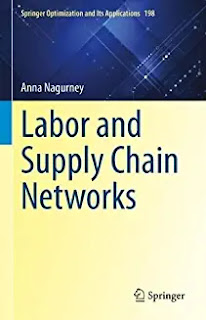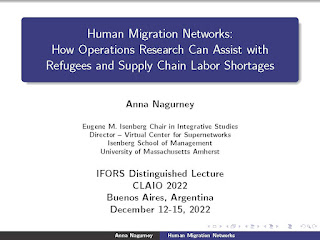I am back from Buenos Aires, where I had the great honor of giving the IFORS Distinguished Lecture (IDL) at the CLAIO 2022 Conference, which took place in beautiful Buenos Aires, Argentina from December 12-15.
Professor Emilio Carrizosa of the University of Seville in Spain was very kind in sending me the photo below from the beginning of my lecture, which was on December 13.
The venue for the conference was the stunning Infinity Building at the University of Buenos Aires with lovely atriums. I was amazed at the different countries that the conferees came from.
I would like to thank Professor Javier Marenco for all the courtesies extended to me and for all the logistics and arrangements. Thanks also to Manuela Blaum. The conference website can be accessed here.
As the daughter of WWII refugees from Ukraine, I am very passionate about developing rigorous frameworks that can assist policy-makers in decision-making associated with human migration flows.
In my lecture, I emphasized the importance of multidisciplinary perspectives for addressing issues associated with human migration across national boundaries due to climate change, conflicts, violence and wars, as well as poverty and the desire of certain migrants to attain greater economic opportunities and prosperity. I have been developing mathematical models of human migration networks since 1989 and, with a greater intensity in the pandemic, have been working with collaborators through the Virtual Center for Supernetworks that I founded in 2001 and continue to direct.
Between 11 March 2020, when the WHO declared COVID-19 a pandemic, and February 22, 2021, nearly 105,000 movement restrictions were implemented around the world, according to the International Organization for Migration. Many of the migrants take dangerous routes and multiple modes of transportation, some of which are hazardous. The models that I described include various policy interventions by governments. I noted that the proper allocation of quantifiable subsidies by governments can lead to a societal optimum. I also spoke about multiple refugee crises now on the planet including the largest since WWII - that of the refugees fleeing the war in Ukraine.
My slide deck can be accessed by clicking on the link.
I am grateful to amazing collaborators with whom research on human migration networks continues - including Professor Patrizia Daniele and Giorgia Cappello of the University of Catania in Italy, Professor Ladimer S. Nagurney of the University of Hartford, as well as new collaborators, Professor Fabio Raciti, also of the University of Catania. and Professor Mauro Passacantando of the University of Milan-Bicocca. The latter two became collaborators after the wonderful ODS conference in Florence!
In addition, I discussed models that integrate supply chain networks with labor and human migration in order to gain insights as to the potential benefits of companies' investments in attracting international labor. The models allow for different wages to be paid for various supply chain activities including production, transportation, storage, and last mile deliveries. In addition, the models permit distinct wages for domestic versus international migrant labor and also include the impacts of honesty in informing international migrants of their wages or not. Capacities on domestic labor are included to capture existing shortages in different sectors. The case study consists of one of the most expensive food products - that of truffles. The numerical results show that governments need to make sure that workers are paid the wages that they deserve. Governments also need to make sure that international migrants are paid the same wages as domestic workers as emphasized by UN Sustainable Development Goals. I highlighted other recent research, which establishes that companies can improve upon their profits by paying workers what they deserve to be paid. I argued for a holistic approach to supply chains and one that must include the most important resource - that of labor.
In my excitement, I mentioned my new book, "Labor and Supply Chain Networks," which will be published next month by Springer.
I was presented with an award plaque with clock, a certificate, as well as an honorarium.
I was delighted to meet faculty and students from Mexico, a colleague from Ecuador and even a friend - Professor Raghu of the University of Maryland was at CLAIO 2022!
It was an especially exciting time to be in Buenos Aires since on Tuesday, shortly after my Distinguished Lecture, Argentina beat Croatia to advance to the final match in the World Cup.
It was extraordinary that I personally was able to have wonderful conversations with conferees from: Argentina, Brazil, Denmark, Ecuador, France, Germany, Mexico, Scotland, and the US!
It is truly special to be an Operations Researcher with colleagues around the globe having significant positive impact on addressing so many societal and economic problems.
The list of previous IFORS Distinguished Lecturers is available here. I am amazed at how many I actually know and I cite quite a few, including the Nobel laureate John Nash since we do a lot of game theory models for supply chains.
I would like to also express my appreciation to the Argentinians for their warmth and hospitality and the great food at the cafes and bakeries. I was even let into a lovely museum with a garden for free!
My flights on Delta, including the 10 hour ones to Buenos Aires from Atlanta and back were comfortable and on time!
I leave you with some additional photos taken while in Buenos Aires.
And tomorrow is the final match of the 2022 World Cup with Argentina versus France!








































